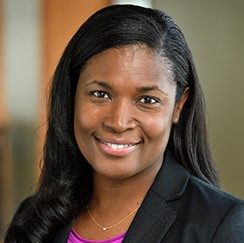Many factors can affect how someone deals with trauma—from one's past and current environment and background to other mental health issues.
Getting help early definitely helps people reduce the risk of experiencing more negative effects to their trauma or PTSD down the road.
Tamar Rodney, PhD, PMHNP-BC, CNE is an assistant professor at Johns Hopkins School of Nursing.
Her research and clinical work focus primarily on improving PTSD diagnosis and treatment.
For information about treatments for PTSD please visit The Treatment Hub.
An individual’s predisposition to trauma will affect the way they respond to future traumatic events. And so this is well-documented that there is a genetic component, but that’s not all; there is an environmental risk for stress. You know, how much stress are you experiencing in your life? That also predisposes to how you might be affected. Other mental health issues that an individual might be carrying or having previously experienced or even getting treatment for does altogether increase your risk.
So, no single factor will say that you are going to be the person who reacts negatively to trauma, but taken together, they do increase your risk of experiencing a traumatic event worse than someone else who would. And I also want to say that the support you get afterwards can either lower your risk or increase your risk. And so that’s also something to be mindful of, and it’s also a reminder that getting the help you need would lower the risk of it negatively affecting you going forward.
And I’m always a promoter of getting help, you know, asking the questions, not being afraid to or ashamed to say that I need help, which is also important, but ultimately what it does, it reduces your risk of having something negatively affect you further down the road.
BrainLine is powered in part by Wounded Warrior Project to honor and empower post-9/11 injured service members, veterans, and their families.
About the author: Tamar Rodney, PhD, PMHNP-BC, CNE
Tamar Rodney, PhD, PMHNP-BC, CNE is an assistant professor at Johns Hopkins School of Nursing. Her research and clinical work focus primarily on improving PTSD diagnosis and treatment.

